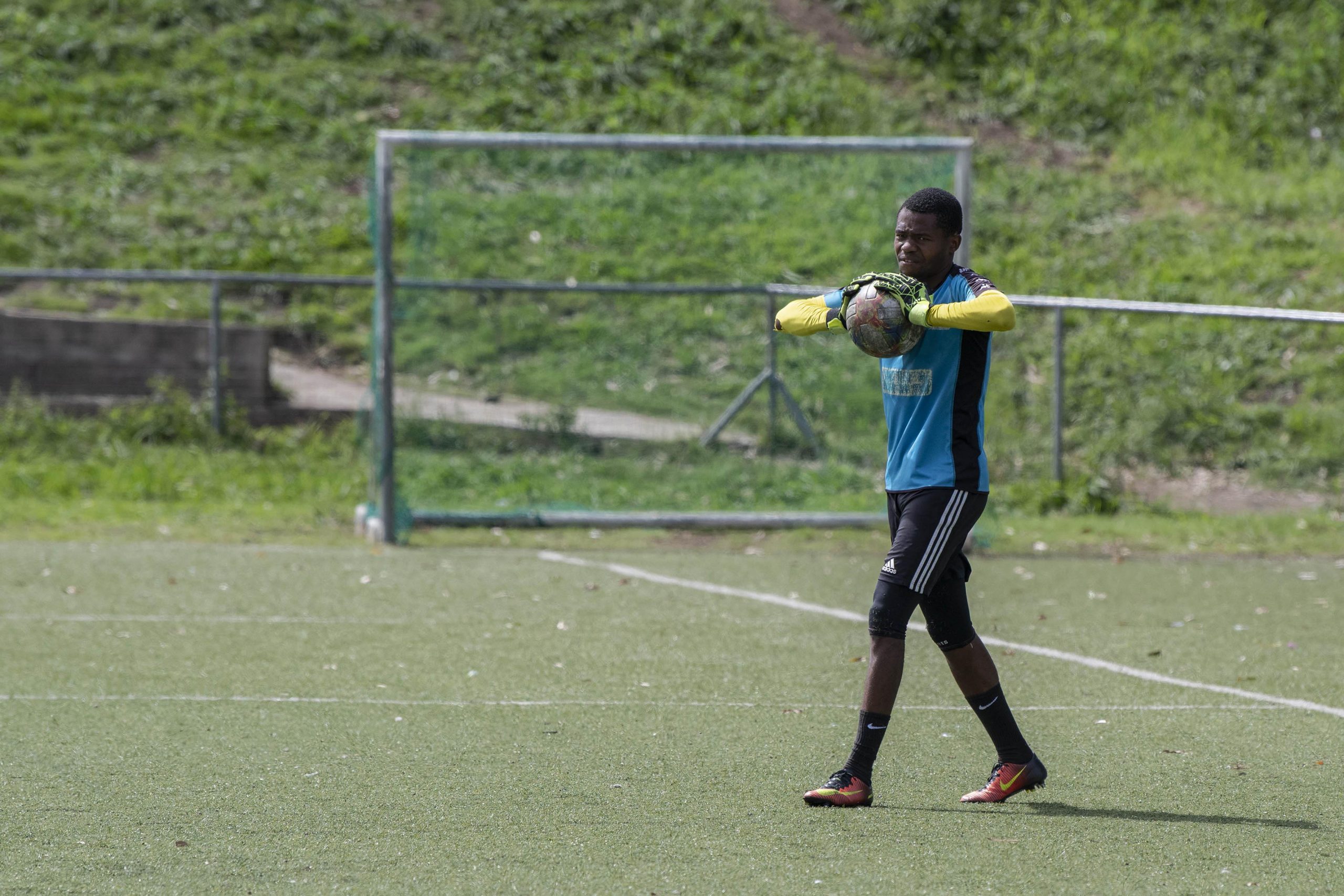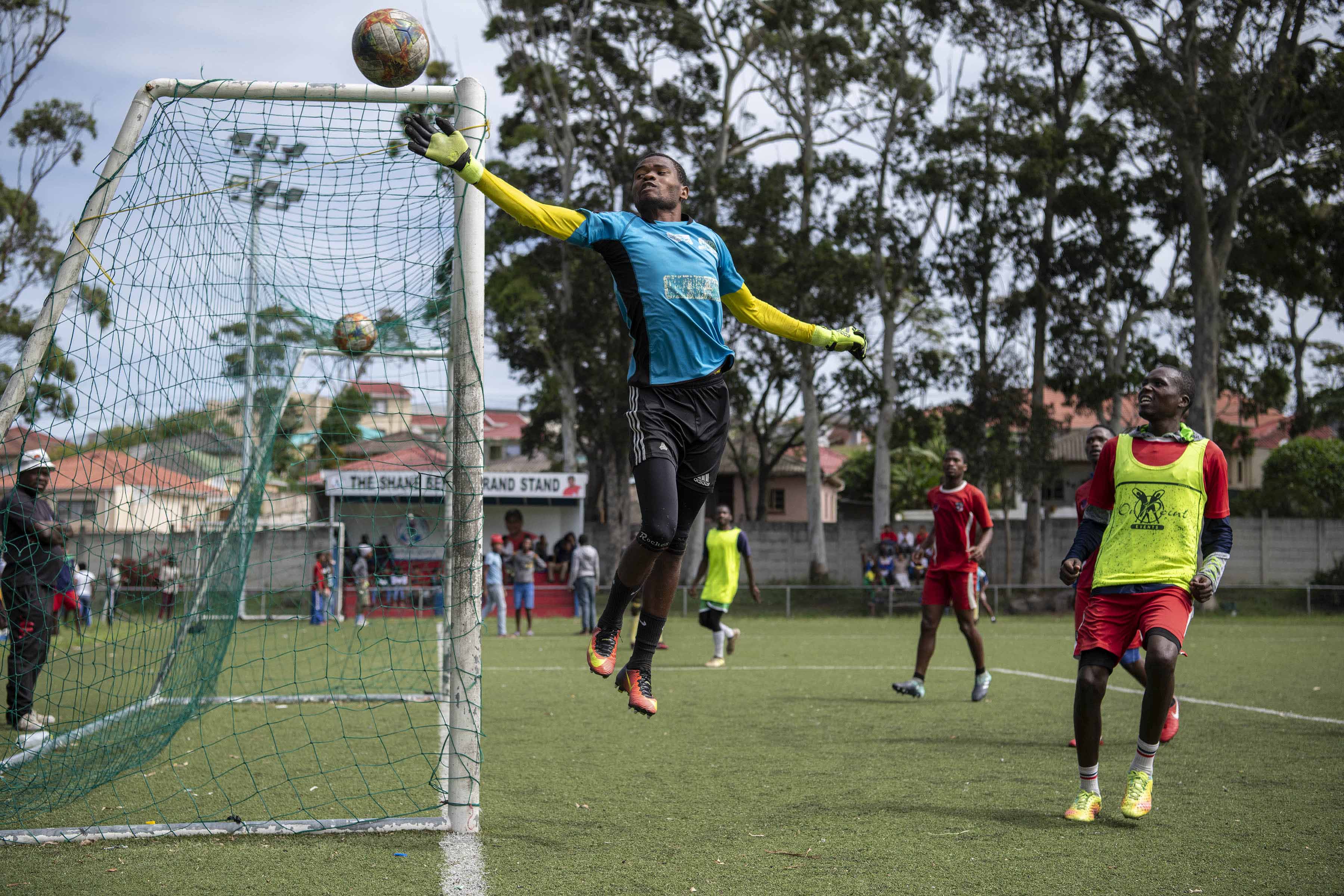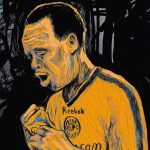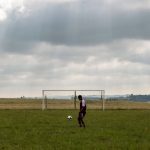Phuti Lekoloane paves LGBTQIA+ way for footballers
The Tornado FC goalkeeper talks about the homophobic abuse he has endured in his life and career, revealing why he returned to football after its ugly side forced him to quit.
Author:
29 April 2019

“I didn’t fall in love with football, football fell in love with me,” Phuti Lekoloane said confidently at his home in Mdantsane in the Eastern Cape.
The word footballer doesn’t do justice in explaining who Lekoloane is and what he stands for. The goalkeeper of amateur side Tornado FC is an activist and a trailblazer. He is walking barefoot in a forest of thorns so that future generations will walk the path he has painfully cleared without trouble.
Lekoloane is doing all of this in a sport that those who remember him from his school days are shocked he is a part of.
“Usisi, playing football? That can’t be,” Lekoloane said, laughing loudly as he mimicked his teacher’s response on hearing that he is now a footballer.
The beautiful game has an ugly side to it. The macho side of football is not only sexist but also terribly homophobic. Justin Fashanu, the first professional footballer to be openly gay, can attest to it. Fashanu’s coach at Nottingham Forest, Brian Clough, made homophobic comments about the English forward. He went on to repeat them in his book, Clough: The Autobiography, as he saw nothing wrong with them.
“‘Where do you go if you want a loaf of bread?’ I asked him. ‘A baker I suppose’. ‘Where do you go if you want a leg of lamb?’ ‘A butcher.’ ‘So why do you keep going to that bloody poofs’ club?’”, Clough recollects a dressing down he delivered to Fashanu on hearing rumours that he was visiting gay bars.
Fashanu was sidelined and eventually sent on loan to Southampton after coming out. That was in the 1980s. The same mentality still exists now, with a number of professional players saying it would be difficult for any footballer to come out because of the machismo that surrounds the so-called beautiful game. Locker room talk and the language used in football has strong homophobic undertones.
‘Don’t pass the ball like a faggot’
“I’ve had coaches say don’t pass the ball like a faggot. What does that mean? I am passing the ball like everyone else and I am gay,” said Robbie Rogers in an interview on the BBC’s HARDtalk television programme. He was the second footballer, after Fashanu, to come out as gay.
“When I was younger and heard things like that, I would internalise it and get more depressed, which is dangerous.”
Rogers admitted that it was difficult for him to come out, going on to reveal that he had to suppress his true self owing to the macho nature of football. Lekoloane laughs when asked what the reaction was when he came out. He was never in the closet, which meant that he suffered abuse from an early age.

“What helped me to be comfortable in my skin is that my family supported me. My mom and I never really had a conventional mother-son relationship. We were like friends. She was understanding. She never asked funny questions about my sexuality, entlik (actually) she is the one who sat me down and spoke about being safe when having sex.
“My dad was always away. We never had a father-son relationship. But he was always there whenever I needed him. Even now, he is always there for me, there is an understanding. He just had a problem with my voice, but now he likes [it],” Lekoloane said with a smile.
It’s the outside world that gave the Moletji-born, Tembisa-raised 26-year-old problems.
“It was difficult at school, where you needed to pay someone to go into the toilet,” Lekoloane said. “Sometimes they would take my books because I am gay. They would call me names. It was very, very difficult. But then one had to survive.
“I cried a lot. They would beat me and I would cry, walk home and try to come back stronger tomorrow. They would beat me again, I would cry, go home and come back. That’s how I survived. You don’t fight back because it would have ended badly. I had to take the beatings to survive.”
Paving the way for LGBTQIA+ footballers
The abuse and discrimination he endured at school didn’t end there. It followed him into his next chapter as a footballer. Inasmuch as South Africa’s Constitution is progressive, with the country being the first African nation to legalise same-sex marriage, that act isn’t worth the piece of paper it is written on for black and poor persons who are LGBTQIA+.
A study done by the South African Institute of Race Relations (IRR) revealed that four out of 10 who identify as LGBTQIA+, 49% if they are black, know someone who has been murdered because of their sexuality. Those who aren’t murdered are discriminated against, which is why Lekoloane is vocal about his sexuality.
Related article:
“My purpose in life is to pave the way for the LGBTQI community in football, to fight for inclusion and equality,” Lekoloane said. “There are a lot of gay footballers, but they are scared to come out. I have met a lot of gay guys who had to retire from football because of discrimination.
“I have also met people who are in the professional ranks who are in the closet and are scared of coming out. I am trying to create a safe space for them by being vocal about it. I have been the sacrificial lamb since day one.”
Compared to a murderer
Being the “sacrificial lamb” has come with its fair share of trouble, from being overlooked as a footballer to being called names.
“I quit football at one point because the discrimination was too much. I couldn’t take it anymore. There was a time when I was compared to a murderer. A teammate of mine [at ABC Motsepe League team, JDR Stars] said that if I was able to engage in sexual activity with another man, I am as good as a murderer.
“That slowly killed me. But then I regained my strength to come back and do what I am passionate about. I never told anyone at the club about that incident. This is the first time I am talking about it. It’s one of the reasons why I left [JDR].”
Related article:
Tornado FC not only offered him a new team and a change of scenery, they offered him a home where he would be comfortable in his skin without fear of being judged or victimised. It took some convincing for him to relocate from Johannesburg to East London.
The Eastern Cape is not exactly paradise for LGBTQIA+ people. The IRR study also revealed that those identifying as LGBTQIA+ are three times more likely to be attacked in the Eastern Cape than in any other province in the country.
A conversation with Yanga Nyobo, the team manager and daughter of Tornado’s former chairman, Siphiwo “Mawawa” Nyobo, convinced Lekoloane to join the East London-based club.
“I assured him that he is coming to a good team and will have a good time, despite the fact that he is a gay guy,” Yanga Nyobo said. “I told him, ‘Trust me, you will fit in here because the team is run by me and I am also gay. So your sexuality isn’t an issue. No one is going to judge you or anything. In our team, we advocate for diversity.’
“Here, we accept people for who they are. We make sure that our team understands that before they even go anywhere. We don’t want people judging each other, whether it’s based on your race, religion or sexuality. Phuti didn’t have to be someone he isn’t. He was very shocked to be in a team where he is allowed to be free, even our chairman called him Baby because that’s what he likes to be called.”
Death that shook East London
Siphiwo Nyobo’s death shook not only Tornado FC but the whole of East London as the traditional healer and businessman was a popular and well-respected figure in the area. Nyobo was gunned down outside North End Stadium after seeing his team beat Birmingham FC 4-1 on 2 April. Lekoloane lost an understanding boss, a mentor and a father figure.
“His death was very difficult because it felt like I lost a part of me,” Lekoloane said with a lump in his throat. “I lost somebody who believed in me. We were planning to do so much. He is the one person who told me not to hold back and stay true to myself. He believed that I had a lot to offer to football. He was very open to me.
“He treated me like one of his sons. There was no point in time where he would point out that I am gay, so I will treat you differently. There was respect between me and him. We never spoke about my sexuality but he respected the brand, the Phuti Minaj brand [Lekoloane’s nickname]. He valued my presence a lot.”
More than just a team
Nyobo’s house is a stone throw’s away from where Lekoloane lives. You pass by it, on a newly laid tar road, before you get to Lekoloane’s place. The late Nyobo’s house is a hive of activity on any given day.
“Our father believed that everyone can call our house their home,” Yanga Nyobo said. “There are people at our home who I had never met before they started living there, and they have been there for five, six and seven years. It’s like a refugee camp, because he always accepts people.
“That was passed on to us and we pass that to our team. We have people who come here to play for Tornado, they don’t fit into the team and we find another place to accommodate them. We accept people for who they are and we empower the players. Tornado is not just a team, it’s a home for the people.”
Related article:
Those people, in Mdantsane, see Tornado as their hope for professional football in the area. Chippa United attracts large numbers whenever they play at Sisa Dukashe Stadium, but the club is not truly theirs. The Chilli Boys, founded in Cape Town, play most of their games in Port Elizabeth, almost 300km away.
Isivunguvungu, as Tornado FC are affectionately known, moved closer to giving East Londoners a consistent taste of professional football by winning the Eastern Cape’s ABC Motsepe League. They will now battle with the other eight provincial winners in Cape Town in the play-offs for one of the two spots in the National First Division that are up for grabs.
Should Lekoloane lead Tornado to a top two finish in the Mother City, he will become the country’s first openly gay professional footballer. Achieving that this way would be the equivalent of Lekoloane kicking down the door that has been slammed in his face.
“Tjo! Tjo! That would mean a lot,” Lekoloane said animatedly. “I have been rejected because of my sexuality. People have overlooked my talent, only focusing on the sexual orientation part. I don’t think that I have been given a fair chance in football, but that’s all in the past. I am focused on creating a platform for young, gay football players. It’s no longer about me, it is about fighting for the young ones who are coming up.”
Lekoloane uses laughter to mask his pain when he talks about the people he has lost. It’s an uncomfortable laugh that’s nowhere near his real laugh, which is loud and infectious. That uncomfortable laughter shot out of his mouth before he composed himself to talk about the death of the legendary John “Shoes” Moshoeu.
Inspired by a Bafana Bafana legend
The 1996 Africa Cup of Nations winner with Bafana Bafana gave Lekoloane direction in his football career. It’s only after working with Moshoeu that Lekoloane started taking football seriously. Lekoloane wears jersey No. 91, like Shoes did in his second stint at Kaizer Chiefs, as a tribute to the ageless wonder who played competitive football well into his 40s before dying in 2015.
“He is one of the people who believed in my talent,” Lekoloane said. “He sat me down and said, ‘You are very special. We don’t find people like you every day. You’ve got a story to tell. If you don’t make it in football, you don’t make it big, someone will make it because of you.’ From that day, I never looked back.
“We were very close, some people thought that I was his son because we would spend a lot of time together. His death hit me emotionally because I was there when he was gathering his last strength. I am one of the few people he spoke to before his passing. He told me to respect everyone, because I was with Shoes it was easy to get big-headed. He played a big role in my life.”
Related article:
Moshoeu’s words – that even if Lekoloane doesn’t make it big in football, someone else will make it because of him – is the fuel that drives the 26-year-old. But being a martyr, as glorious as poets and writers make it out to be, is a lonely, draining and tiresome job.
“I am on my own,” Lekoloane said. “I’ve got no one to lean on. I’ve got no organisation to go cry to. I am my own hero. Sometimes it kills me because I am the one taking the punches alone. But I have made an oath that I’ll be the sacrifice. If God gave me this talent to open doors for others, then let me be that sacrifice.”
So how does he handle everything he has faced?
“I am one person who believes in the power of reading. I get my strength from reading. I read self-motivation books. That’s where I get my strength.”

Comfortable in his own skin
The Tornado FC goalkeeper has a bubbly personality. He is energetic, funny and carefree. Phuti Minaj is unapologetic about his sexuality.
“I don’t know how many times I have been asked, ‘Are you going to share the same change room with us? Are you going to shower with us?’ My response is always the same, if you are not comfortable with yourself then that’s not my problem. I am comfortable with myself. If you don’t want to shower in my presence, it’s okay, but I am going to shower because I am confident and comfortable in my skin.”
Lekoloane brings a calming presence at Tornado FC with his safe pair of hands. There’s a big difference when he is in goal, even during training. His defenders are calmer and more relaxed with him around as the club’s undisputed No. 1 goalkeeper. He waltzes into the North End Stadium like an emperor into his palace. But the life of a goalkeeper is not always this glamorous.
Goalkeepers are under huge scrutiny. Their saves are fleeting in the memory of supporters while their mistakes last an eternity.
“They also call him doorman, goalie, bouncer or tender, but he could just as well be called martyr, pay-all, penitent or punchbag,” Eduardo Galeano wrote in the beautiful game’s bible, Football in Sun and Shadow. “They say where he walks, the grass never grows.”
Learning from a former goalkeeper
Luckily for Lekoloane, his coach understands the position well. Tshepo Motsoeneng, a former goalkeeper who played more than 100 matches in the Absa Premiership for teams like Santos and SuperSport United, understands the dynamics of the position well.
“Goalkeepers are like presidents, you make a decision and there’s an uproar in the whole country or they clap for you, but in a short space of time the people who clapped for you, turn on you,” Motsoeneng said. “Goalkeeping is a stressful position, today you are a hero and tomorrow you are a villain. I am trying to teach him that.
“He mustn’t celebrate a lot or think that people will always have his back. There’s a lot going on when you are a goalkeeper. He could try to do something today and people don’t love it, and he does something tomorrow and people love it. He must never expect anyone to always be in his corner. If you check, on the field of play he wears different colours to his teammates. He is a different player with different responsibilities and pressure.”
Related article:
That pressure doesn’t faze Lekoloane. With everything he has faced, being called names for making a mistake is a picnic compared with what he had to endure to be here.
“I chose to be a goalkeeper because of netball. I once played as a striker and then I quit football to play netball. When I came back, I chose to be a goalkeeper because I fell in love with catching balls,” he said with a naughty grin.
“You know what they say, to be a goalkeeper you either have to be crazy or gay. I am gay! My character and everything I have faced helps me to deal with the criticism and heavy scrutiny that goalkeepers are under. I am strong and courageous. If I make one mistake, I’ll still come back and save the team. It’s not about one mistake, it’s about what can you do after that one mistake.”





